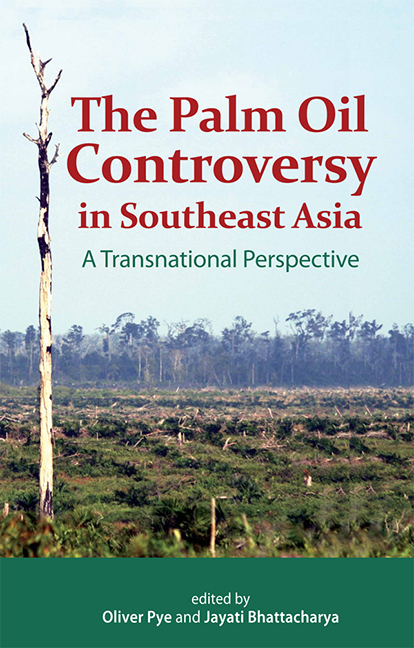Book contents
- Frontmatter
- Contents
- Foreword
- Preface
- Contributors
- Abbreviations
- 1 Introduction
- 2 Malaysian Corporations as Strategic Players in Southeast Asia's Palm Oil Industry
- 3 The Political Ecology of the Indonesian Palm Oil Industry
- 4 Evolutionary Change in the Oil Palm Plantation Sector in Riau province, Sumatra
- 5 Contradictions of Palm Oil Promotion in the Philippines
- 6 The Political Economy of Migration and Flexible Labour Regimes: The Case of the Oil Palm Industry in Malaysia
- 7 Migration and Moral Panic: The Case of Oil Palm in Sabah, East Malaysia
- 8 Reconciling Development, Conservation, and Social Justice in West Kalimantan
- 9 An Analysis of Transnational Environmental Campaigning around Palm Oil
- 10 EU Biofuel Policies and their Implications for Southeast Asia
- 11 Leveraging Product and Capital Flows to Promote Sustainability in the Palm Oil Industry
- 12 Free, Prior, and Informed Consent? Indigenous Peoples and the Palm Oil Boom in Indonesia
- Index
- Plate section
1 - Introduction
Published online by Cambridge University Press: 21 October 2015
- Frontmatter
- Contents
- Foreword
- Preface
- Contributors
- Abbreviations
- 1 Introduction
- 2 Malaysian Corporations as Strategic Players in Southeast Asia's Palm Oil Industry
- 3 The Political Ecology of the Indonesian Palm Oil Industry
- 4 Evolutionary Change in the Oil Palm Plantation Sector in Riau province, Sumatra
- 5 Contradictions of Palm Oil Promotion in the Philippines
- 6 The Political Economy of Migration and Flexible Labour Regimes: The Case of the Oil Palm Industry in Malaysia
- 7 Migration and Moral Panic: The Case of Oil Palm in Sabah, East Malaysia
- 8 Reconciling Development, Conservation, and Social Justice in West Kalimantan
- 9 An Analysis of Transnational Environmental Campaigning around Palm Oil
- 10 EU Biofuel Policies and their Implications for Southeast Asia
- 11 Leveraging Product and Capital Flows to Promote Sustainability in the Palm Oil Industry
- 12 Free, Prior, and Informed Consent? Indigenous Peoples and the Palm Oil Boom in Indonesia
- Index
- Plate section
Summary
The oil palm, elaeis guineensis, is native to central Africa, but can be grown successfully as a commercial crop in tropical lowland areas. The products from the palm — crude palm oil, palm kernel oil, palm kernel meal, and their derivates — are extremely versatile, and, in addition to widespread use as cooking oil, are important ingredients for the food, cosmetics, and chemical industries and as animal feed. Indonesia and Malaysia together account for over 80 per cent of global production and Europe is one of their biggest markets.
The boom in the palm oil industry is breathtaking. Global output of crude palm oil increased by 65 per cent between 1995 and 2002. The area devoted to oil palm plantations in Indonesia and Malaysia doubled to ten million hectares between 1995 and 2005. New plantations and expansion targets are being developed in the Philippines, in Thailand, and in Papua New Guinea, but also in Africa and Latin America. The expansion of oil palm plantations is a key component of government development strategies across the region.
The links to, and importance of, Europe in this development are profound and manifold. Europe is not only an important and expanding market for palm oil products. European banks, the food and chemical industries, and agribusiness are intertwined with the industry at different levels. At the same time, the European Union and the Association of Southeast Asian Nations (ASEAN) are cooperating both in expanding free trade between the regions and in environmental protection.
THE CONTROVERSY
European action to combat climate change, perhaps ironically, has intensified the controversies surrounding palm oil. Environmental non-governmental organizations (NGOs) based in Europe, concerned by the rapid expansion of oil palm plantations in Southeast Asia, had been targeting the industry in the 1990s, campaigning around media-responsive species such as orang-utans. The exposure of the industry to negative publicity led to the formation of the Roundtable on Sustainable Palm Oil (RSPO). The stakeholder initiative, which includes leading corporations and the WWF, set down criteria for sustainable palm oil, such as a zero-burning policy and no conversion of High Conservation Value Forests.
- Type
- Chapter
- Information
- The Palm Oil Controversy in Southeast AsiaA Transnational Perspective, pp. 1 - 18Publisher: ISEAS–Yusof Ishak InstitutePrint publication year: 2012



